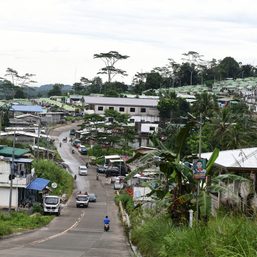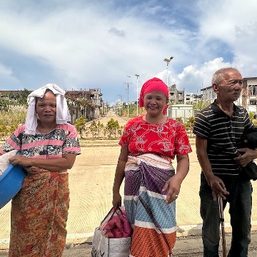SUMMARY
This is AI generated summarization, which may have errors. For context, always refer to the full article.
![[OPINION] The military’s wrong war](https://www.rappler.com/tachyon/2020/10/TL-marawitl-the-militarys-wrong-war.jpg)
There is a scene in Criselda Yabes’ tour-de-force of a book, The Battle of Marawi, where elite soldiers – suddenly deployed to hunt for a top terrorist in enemy lair – had to share their sophisticated radio units with other troops who were using cheaper versions that obviously ran on a different frequency. In another battle zone, troops positioned to rescue soldiers trapped in the city’s infamous bridge of death, but they struggled in night reconnaissance because they didn’t know how to use the night-vision goggles issued to them.
And then one morning in June 2017, as the Marawi siege entered its second month, Air Force pilots prematurely dropped a bomb on Army troops huddled for a quick meal, killing 10 infantry soldiers and wounding 7. “They had seen the plane coming, its underbelly not quite flat before the bomb fell on them, the pilot punching the drop button too soon,” writes the veteran journalist. “Following this devastating incident, [the] Westmincom [chief] would refuse any air bomb; it would take about a month before he could bring himself to resume orders for their air sorties.”
Yet, it would not be the first fratricide in the war.
As top defense and military officers drown us in their noisy war against the Left and a hysterical general basks in publicity and propaganda, Filipinos are made to forget the deep-seated problems in the armed forces that are paid dearly by their men in the battlefield.
Do they ever learn?
Cris’ book made me twitch and toss in bed – partly due to rage, partly due to disbelief, partly due to pain, a heady brew of emotions that perhaps only journalists who have spent a lifetime listening to soldiers’ woes and cries could relate to.
How can these operational blunders continue to happen? How can we still not know the enemy, their plans, their territory? How can commanders – at this age and time – apply old thinking to a new world order that drives young men to war and equips them for it? Why, for all of the military’s institutional knowledge of Mindanao, are officers still caught with their pants down? What’s the use of armored tanks and fighter jets in a battlefield that intelligence units are clueless about?
In just one of the various head-banging paragraphs of the book, Cris writes: “The first salvo was the trigger of a Rocket-Propelled Grenade or the RPG – slamming through the gate but with no sound of a burst. It was a dud. They tried again, the second grenade going through but flying off further back by the wayside of the gate, landing at a bamboo shack that was an empty vendor’s stall. It exploded but the target was way off the mark.”
The Battle of Marawi is more than the story of the 5-month destruction of Mindanao’s Islamic city in 2017 that killed close to 200 government forces and displaced more than 200,000 residents. It’s an indictment of the military as an institution, and the civilian leaders tasked to oversee it.
Through the lens, bravery, and folly of the men in the trenches, Cris shows us – in riveting pace and rich color – the weakness of command, the clash of vested interests, the sloppiness of plans, the failure of intelligence, the fatal mismatch of logistics and deployment, the incompatibility of man and machine, the whimsical deadlines of politicians, the bad blood between units, and a lumbering giant’s utter loss of brain-and-brawn agility.
Because it is so fast-paced, one could easily be swept away by the book’s masterful story-telling and miss the message. But let Cris kid you not: she’s telling us how fucked up it’s been. At one point, I had to pause and imagine myself doing this back and forth with her: Didn’t this happen various times before, this blinding attack, pintakasi, such as in Al-Barka? Surely they knew what they were getting into, with the Mamasapano fiasco just a two-year-old memory when Marawi erupted? Surely the intelligence community was aware that Marawi had long ceased to be the laid-back lair of passive Moro fighters lulled to sleep by corrupt politicians? Surely they have seen this before, the fire and relentlessness of motorbiking young jihadists – in previous sorties in ISIS-influenced areas in Mindanao?
I mean, what were those deaths for in the last 4 decades if not to make the war machine smarter and fight better?
The real enemy
Yet, The Battle of Marawi is a grim reminder of those battles lost to state enemies – whether jihadists or communists – in the jungles of Basilan or Sulu; in the flatlands of Maguindanao; in the lush mountains of Quezon and the Sierra Madre; in the narrow streets of Zamboanga City.
Each page shows us that most of the lessons from those battles have not gone beyond the grieving and the pounding of men who vow things would change and that they’ll do better.
Marawi is proof that bad habits never change, and they become the norm.
What was the point of the bloodletting in Zamboanga City 4 years prior if the mistakes committed there would still be repeated in Marawi? Did the armed forces embrace the challenges of urban warfare, which the Zamboanga siege was, and did the generals train and prepare their men for the next wave?
What was all this focus on terror and training since 9/11 if soldiers would act like occupying forces in Marawi, unaided by intelligence, blind to its urban maze, unfamiliar with what’s stockpiled in its homes? Where did all the sleuthing go if not to prepare troops and the chain of command for a war like this – when every house is a rebel hideout and every building is a vantage point for attack?
Where did our taxes go? To build intelligence on unarmed critics and fatten agents?
Could the razing of Marawi have been avoided if the military and its civilian counterparts in this war on terror did their jobs? The Battle of Marawi has the answer to that – spilled in the anguish, confusion, and blood of the troops.
The book becomes an important and timely read precisely because of these questions. Antonio Parlade and his Facebooking ilk should read it – to bring them face to face with their real enemy: the enemy within. – Rappler.com
Add a comment
How does this make you feel?






There are no comments yet. Add your comment to start the conversation.